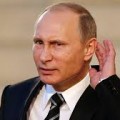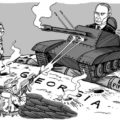In 1993, Russian leader Boris Yeltsin, who was a key figure in breaking up the USSR and who served as Russian president from 1991 to 1999, said that “Corruption in the organs of power and administration is literally eating away the body of the Russian state from top to bottom” as reported by John Kramer writing for the Eurasia Center.
Over the weekend, protests in numerous Russian cities were held to focus on corruption charges against Prime Minister Demetri Medvedev, who is said, according to the BBC, to possess mansions, yachts and properties that he couldn’t afford on his salary. It is alleged that Prime Minister Medvedev even “had a special house for a duck on one of his properties – and on Sunday, some demonstrators held up images of yellow rubber ducks.” Prime Minister Medvedev’s spokeswoman called the allegations against him “propagandistic attacks”.
Americans may particularly remember Mr. Medvedev as the recipient of Mr. Obama’s infamous “whisper” at a conference in which the former U.S. president promised to “be more flexible” in reducing U.S. ABM defenses after his re-election.
Bloomberg news notes that the independent Ekho Moskvy radio station reported that “60,000 people participated in 82 protests around the country.” This resulted in numerous detentions in Moscow, and the heavy presence of riot police.
Alexei Navalny plans to run for Putin’s job in 2018. The Kremlin has attempted to short-circuit his candidacy by levying potentially false embezzlement charges against him. This past weekend, Alexei was arrested. Authorities accused him of disobeying police. He was fined 20,000 rubles ($352) for organizing a demonstration and sentenced to 15 days in jail. Along with Navalny, in excess of 1,000 people in Moscow were detained. The protests were the largest since demonstrations erupted in 2011 and 2012, when many Russians were enraged about vote-rigging in parliamentary elections and Putin’s gaining the presidency for a third term. (Bloomberg reports that Putin, 64, is likely to seek a further six years as president in elections next March, though he hasn’t officially said he’ll run.)
Russian state television and news publications ignored the protests on Sunday. The U.S. State Department issued a statement strongly condemning the arrest of the protesters,
The Institute of Modern Russia reported in 2013 that “Transparency International has ranked Russia 133rd in its recently-published 2012 Corruption Perceptions Index…According to economist Alexandra Kalinina…corruption in Russia remains ‘not a problem, but a business.’… Corruption has penetrated all levels of government and most other aspects of life in Russia. According to Transparency International’s Corruption Perceptions Index, corruption in Russia is worse than in many African countries…According to Sergei Ivanov, the Kremlin chief of staff, the most corrupt spheres in Russia (in terms of household corruption) are healthcare, education, housing and communal services. In comparison, independent experts from RBC magazine name law-enforcement agencies (including the State Traffic Safety Inspectorate) as the most corrupt sphere in Russia, which is followed by healthcare, education, housing and communal services, and social security services.At the government level, however, the five top areas for corruption are.. Government contracts and purchases, Issuance of permits and certificates, Law-enforcement agencies Land distribution and land relations, [and] Construction.”
Kramer’s Eurasian Center analysis sounds similar to complaints of those in the United States who point to big government as a corrupting factor: “an analysis of political corruption in both the USSR and post-communist Russia reveals that in each state it exhibits strikingly similar (albeit not identical) characteristics, including: (1) manifold opportunities for corruption arising from the massive role of the state in regulating societal life…The distinctive hybrid character of political corruption in Russia today derives precisely from its roots in both the communist and post-communist periods.”
Frank Vernuccio serves as editor-in-chief of the New York Analysis of Policy and Government at http://usagovpolicy.com/

















Follow Us